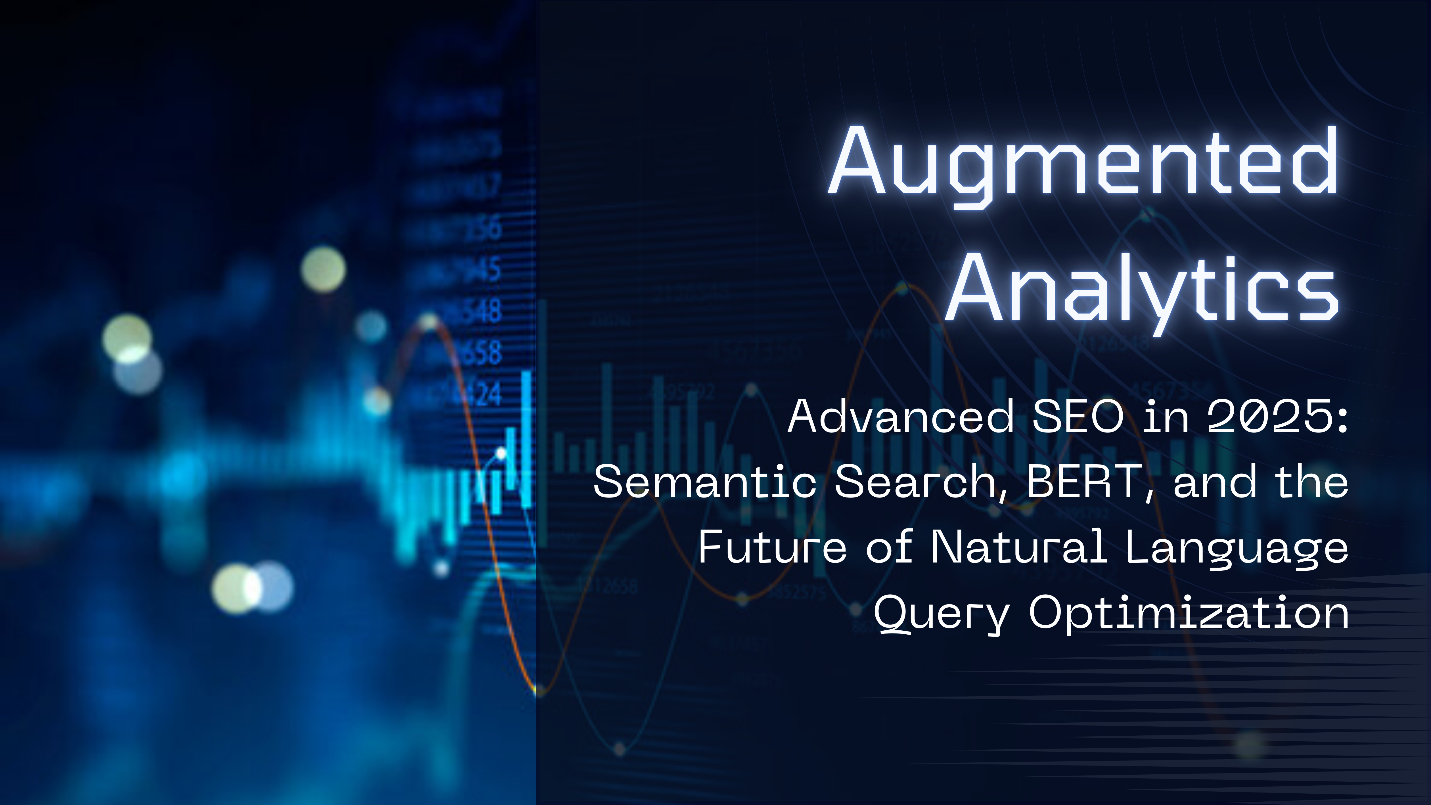The growing landscape of search engine optimization (SEO) is shifting towards optimizing the extreme estimation of the users from the traditional keyword-based strategies. The explosion of the original language queries that are propelled because of various factors such as AI assistance, voice-based searches, and new algorithms for search engines requires a more developed approach for the optimization of the content. The advanced SEO investigates the role of semantic search, and BERT algorithm in transforming the SEO factors. Augmented analytics is becoming an important tool that mainly includes the power if semantic search that transforms the natural language query optimization.
Semantic Search
Semantic search engine technology that uses artificial intelligence, mainly machine learning and natural language processing to identify the content, and relationship between words and synonyms. Semantic search shows a shift mainly in how the search engine processes various queries. Instead of just matching the keyword, semantic search focuses on interpretation of the context based on the users search input. This includes the streamlining of relationships between various places, people, synonyms, and other broader topics. For advanced SEO it requires:
- Intend-Driven Content: The optimizers should focus in creating the content that mainly addresses the main target behind the search that includes the information, transaction, and navigation among others, rather than just including the keywords.
- Entity Based Optimization: The content should be properly structured to clearly define the context so that the engines are able to accurately map the relationships with the knowledge graph that generally includes the structured data and providing a clear connection between the concepts.
- Enhanced User Experience: The semantic search aims in developing more relevant output and enhancing the user experience. This makes clear content organization a clear SEO strategy.
Augmented analytics and semantic research created a system that is assisted by AI in the preparation of data, generation of insight, and explanation.
BERT
BERT that is commonly known as Bidirectional Encoder Representations from Transformers algorithm, is an important factor for advanced natural language processing and Augmented Analytics in various searches. This generally means that there are specific strategies that need to adapt to prioritize content that generally satisfies the users’ needs and prevents the stuffing of the keywords and focus on relevant and well written content. Their impact on advanced SEO generally includes:
- Context Understanding: The processing of BERT allows it to guess the complete content of words that are present in a sentence. It identifies the meaning and nuances of the queries. This means that the content should be written in natural form without the stuffing of various keywords.
- Improved Relevance for Conversational Queries: The adoption of voice searches and the assistances propels more natural queries, and BERT helps Google to offer more exact result for complex and long searches, even when the appropriate keywords are absent.
- Influence on AI Overview and Feature Snippets: BERT improves the understanding of the selected content for the summary and snippets that are generated by AI. Advanced SEO strategies generally focus on providing a clear and direct answer for these models generated by AI.
Natural Language Query Optimization for Advanced SEO
Natural Language Query (NLQ) optimization mainly includes the use of AI and machine learning solutions to translate the human language into database queries for efficient analysis of the data.
For Augmented Analytics, AI and Machine Learning enhances the augmented analytics tool by automating the data to provide more detailed information provided by the user searches. This simplifies the interpretation of content for various SEO professionals.
Conclusion:
The developing landscape for search engine optimization in 2025 is shifting towards understanding the inputs provided by the user. This bypasses the traditional keyword-based strategies. This shift is widely influenced by the exploration of various natural language queries, propelled by factors that included the assistance of AI, voice enabled searches, and the advanced algorithms for search engines, Advanced SEO focuses on the revolutionizing role of semantic searches, and BERT algorithm, with augmented analytics as an emerging tool that enhances the natural language query optimization.
Semantic search, driven by artificial intelligence, machine learning and the processing of natural language, changes how search engines processes various queries. Instead of just matching the keywords, it guesses the entire context and association between the words and synonyms for large topics. For advanced SEO it is important to create intent driven content that mainly addresses the user’s goal, that is generally information, transaction or navigation, instead of simply using the keywords.
Additionally, the entity-based optimization confirms that the content is arranged to define the map connection with the knowledge graph through the structured data. The aim of semantic searches is mainly to deliver the relevant outputs and enhance the experience of the user. This SEO strategy, which is assisted by the AI driven augmented analytics, is mainly for preparation of data and the generation of insights.
BERT is an algorithm that is used for natural processing of language and augmented analytics of searches. It impacts specific strategies of the SEO and arranges the content that is important for user needs and does not consist of relevant and well written data. Additionally,
Natural Language Query (NLQ) optimization uses AI and machine learning to interpret human language into database queries mainly for proper analysis of data, with augmented analytics tools improving this process by automatically interpreting the data for SEO professionals.
